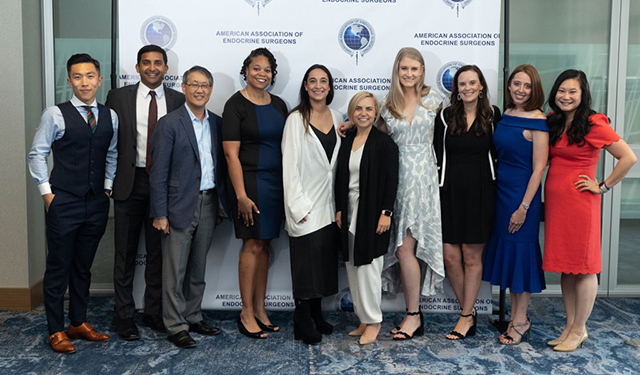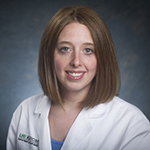
This one-year clinical fellowship will provide extensive exposure to standard and advanced/minimally invasive techniques in endocrine surgery, medical endocrinology, pathology, ultrasonography and laryngoscopy.
Highlights of the Fellowship
Fellows will participate in advanced thyroid cancer operations, minimally invasive techniques of parathyroidectomy (including radio-guided surgery and rapid PTH assay), central and lateral neck dissections, laparoscopic and robotic adrenalectomies, and surgical resection of primary and metastatic neuroendocrine tumors of the GI tract/pancreas.
Fellows will have weekly outpatient clinics with the respective mentoring attendings. These clinics are conducted in a multidisciplinary fashion in conjunction with medical endocrinology and cytopathology.
Fellows will have the opportunity to perform surgeon-directed ultrasounds for patients with thyroid and parathyroid diseases and perform ultrasound-guided fine needle aspirations on patients with thyroid nodules in conjunction with cytopathology attendings.
Fellows will have at least one day a week reserved for non-operative endeavors, including research opportunities. Our endocrine surgery research program provides outstanding research opportunities for fellows to establish their academic careers. Opportunities in clinical research, education research, translational research, basic research and health services research are available. Learn more about endocrine surgery clinical research.
In order to foster their educational experience in teaching and leadership, fellows will participate in all UAB Surgery departmental rounds and conferences. Fellows will organize and lead the weekly Endocrine Surgery Conference, and they will present cases at the weekly Endocrine Interesting Case Conference and the monthly Multidisciplinary Thyroid/Parathyroid Conference. In addition, fellows will present topics of their interest in endocrine disease/surgery to our residents and medical students at their Surgical Education Conference.
Objectives of the Program
Fellows will acquire knowledge of normal and abnormal endocrine gland anatomy and physiology while developing excellence in clinical acumen for endocrinopathies. They will develop a better understanding for the appropriate application of genetic counseling and testing, obtain an appreciation for the molecular developments in endocrine malignancy and become aware of current controversies and areas of future exploration in endocrine surgery. By the end of the fellowship, fellows will be able to perform routine and complex endocrine operations appropriately and safely while understanding their own limitations and being willing to ask for help when necessary.
International Medical Graduates
The funding for our fellowship depends upon the ability of our fellow to obtain full practice privileges at our institution. Therefore, it is a requirement for our fellow to be US board eligible for funding purposes (This includes most Canadian residencies). The applicants must also hold an H-1B visa.
We will consider applicants that are not US board eligible or who do not have an H-1B visa if they do not require salary support during their training. If you are a foreign medical graduate that is not US board eligible then please notify us that you are aware of this policy and will not require salary support.
Program Director
 Brenessa Lindeman, M.D., MEHP, FACS
Brenessa Lindeman, M.D., MEHP, FACS
blindeman@uabmc.edu
Program Coordinator
Tamica Shipman
tshipman@uabmc.edu
Address and Phone Number
506 Boshell Diabetes Building
1720 2nd Avenue South
Birmingham, AL 35294-0012
(205)-975-5000